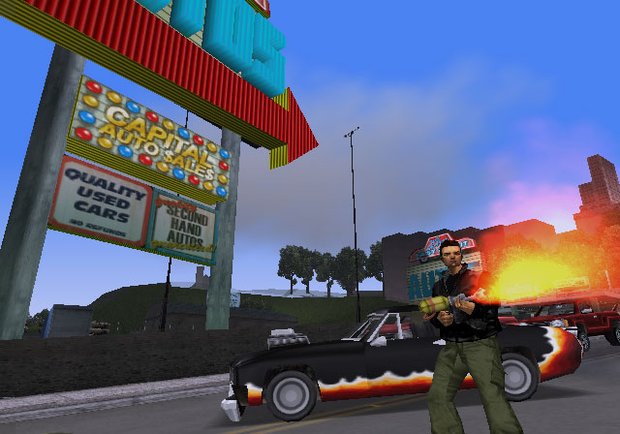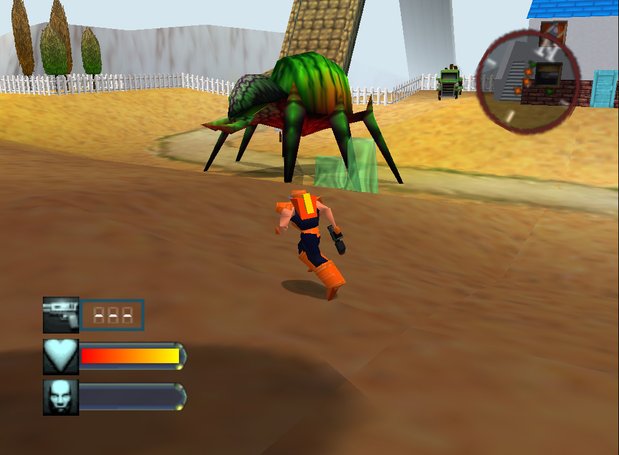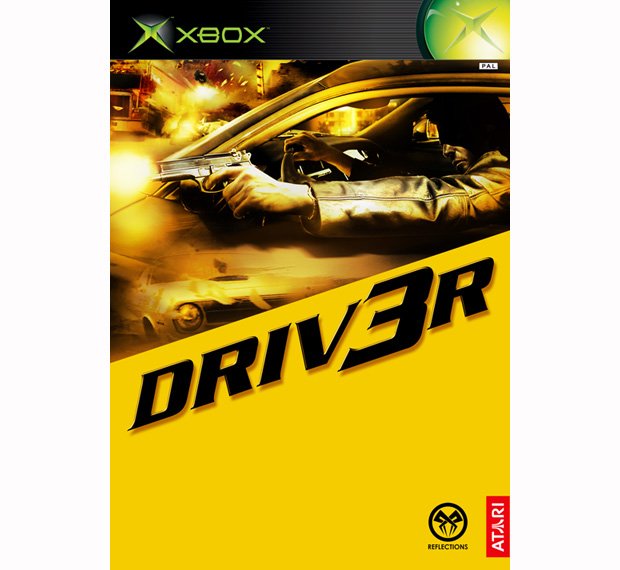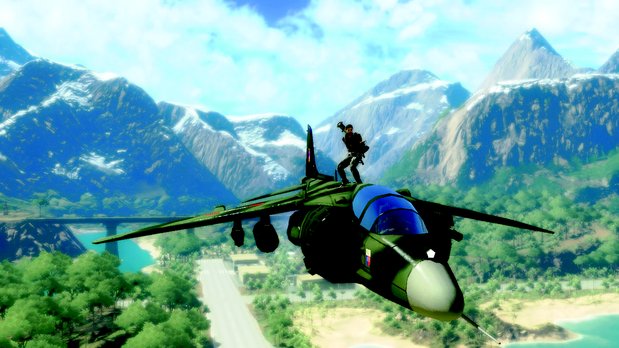The Top 7 Ways Grand Theft Auto III changed the face of gaming
A look back at the single most influential game of the ‘00s
2. It popularized seamless hybrids of driving and on-foot action
For many gamers, GTA III introduced the entire concept of an open world where any vehicle was yours for the taking. Of course, there’s a hint in the game’s title that it wasn’t actually the first time this type of gameplay existed, but even aside from the earlier GTAs, DMA Design (the developer that became Rockstar North) had toyed with the concept in Space Station Silicon Valley (where you didn’t hijack vehicles so much as you possessed robotic creatures) and Body Harvest, which came awfully close to being a prototype for GTA III’s 3D sandbox. Because nobody but the most studious gamers knows what the hell those games even are, however, we have to tip our hat to the original hooker-beater for ushering in the era of run, drive, shoot.
GTA III made “sandbox” a gaming term, and it couldn’t have done it without the interwoven on-foot and on-wheels action. You can’t just plod around a city on foot, after all, so unlike other, more standard action games of the time (which frequently featured distinct vehicle missions separate from the “real” action), GTA III gave players freeform motion. This opened up all kinds of tactical possibilities, like running over enemies, picking a heavy vehicle for increased survivability, and parking your car for impromptu cover.

Above: Getting shot in the back is less of a concern when there's a car behind you to soak up bullets
With driving being such a major part of the game, GTA III couldn’t simply knock out a single physics model and copy-paste it onto all the cars. It needed different behaviors, providing variety and choice – more often than not, specific cars would be better suited to specific missions. In the years since, countless other sandbox games have followed a similar approach, and seamless use of a variety of vehicles has also bled over into less free-form games, like Warhawk, Pursuit Force and the Battlefield series. Even games with no jackable cars, like InFamous and Prototype, probably wouldn’t have developed their sprinting/super jumps/gliding/grinding/parkour without GTA III first showing that to have a truly sprawling world, you need special mechanics for getting around in a hurry. The result is a whole genre of action games in which half the fun isn’t the “action” itself, but the journey along the way.
1. It turned open-world games into a real genre
When GTA III hit, open-world games weren’t really a new thing, but they were relatively rare. PC RPGs like the Elder Scrolls series and Ultima had been giving players absolute freedom for years, and MMOs like EverQuest were setting players loose in huge, detailed 3D worlds. And as we pointed out in the last entry, there were GTA, GTA 2 and Body Harvest, although their 2D presentation and/or obscurity kept them from becoming huge breakout hits.

Above: Body Harvest was GTA III crossed with Earth Defense Force, before either of those things existed. Yeah, you missed out
None of those games, however, managed to create worlds that were quite as vivid and interesting as GTA III’s – or quite as destructible. The freedom to explore sprawling fantasy worlds was one thing, but being able to go apeshit in a convincing, mostly consequence-free clockwork city was quite another.
Sign up to the GamesRadar+ Newsletter
Weekly digests, tales from the communities you love, and more
For some, the result was an unfocused mashup of different game types that didn’t really appeal. But for so many more, GTA III was nothing less than the fulfillment of a promise games had been making for years: a big, open dream world in which we could do whatever the hell we wanted, whenever we wanted to do it, no matter how insane or destructive it might be. It was the world on our own terms, and it was a watershed moment that made open-world sandbox games a genre unto themselves.

Above: For better or (cough) worse
Oh, sure, the initial attempts weren’t much more than (frequently disappointing) knockoffs of GTA’s formula. Gradually, however, sandbox gaming grew and evolved past its criminal origins. Games like Spider-Man 2, Jak II and Mercenaries: Playground of Destruction proved that open worlds could be much more than venal opportunities for joyriding and pedestrian-smashing (although, more often than not, there was plenty of that, too). More recently, series like Assassin’s Creed, Dead Rising, Just Cause, Crackdown and InFamous have refined the genre into something exhilarating, giving players true, complete freedom of movement and lots of room to experiment.

Above: Nothing that led to this existing could possibly be bad
It’s not an approach that works for everyone, of course, but GTA III broke important new ground, and gamers who like to freely explore, experiment with game worlds and generally just tear shit up with no clear agenda owe it a huge debt.
Oct 17, 2011


6 Reasons why kids should play GTA
Why parents, politicians and the media need to leave kids the hell alone

Grand Theft Radar: Daddy's back, you glitches!
Car-killiing swingsets, two-way eyeballs and five more of Grand Theft Auto IV's most entertaining bugs
GamesRadar+ was first founded in 1999, and since then has been dedicated to delivering video game-related news, reviews, previews, features, and more. Since late 2014, the website has been the online home of Total Film, SFX, Edge, and PLAY magazines, with comics site Newsarama joining the fold in 2020. Our aim as the global GamesRadar Staff team is to take you closer to the games, movies, TV shows, and comics that you love. We want to upgrade your downtime, and help you make the most of your time, money, and skills. We always aim to entertain, inform, and inspire through our mix of content - which includes news, reviews, features, tips, buying guides, and videos.


